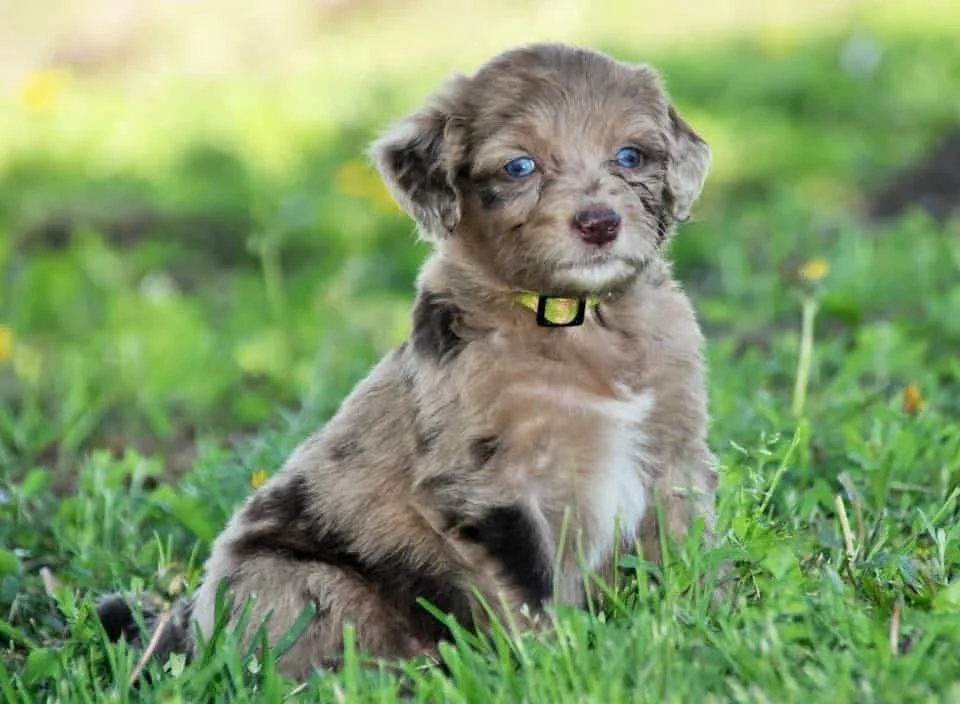Aussiedoodles are very energetic and intelligent dogs with intense personalities and love to stay close to their humans. Some owners even regard them as rather ‘vocal’ dogs. While they do not bark a lot, you may sometimes find your Aussie whining.
Your Aussiedoodle may be whining for many reasons, including excitement, anxiety, illness, injury, or simply seeking attention. There are a few ways to figure out why your Aussie is whining and strategies to curb this behavior if it is excessive.
Your Aussie’s occasional whining without any underlying reason can be adorable. However, excessive whining needs to be looked into for both your dog’s health and for a quieter home.
What Does It Mean When Aussiedoodle Puppies Whine?
It is important to understand that not all whining is a cause for concern. If you have just brought your Aussiedoodle puppy home and find them whining, this is very common. It is simply because puppies are learning to communicate.
They may need to go out to pee, or they might be hungry. They might also just want to play. Puppies tend to whine just like babies cry before they learn to communicate properly!
If the whining appears to be normal puppy behavior, it is important to start correcting it while your Aussiedoodle is still young. This is the time where they will learn the fastest, and you can effectively teach them that whining is not a desirable behavior and does not get them what they are looking for.
How to Train a Puppy Not to Whine
Training your Aussiedoodle puppy to stop being a crybaby is possible but will need commitment from you as well as everyone else the puppy spends time with. It is important for all family members to practice consistent behavior to tell the puppy that whining is not a way to ask for attention.
However, before you delve into training them not to whine, make sure that they are whining for attention and not for a genuine reason – like being hungry or wanting to be let out to relieve themselves.
If all their needs are being met and their whining stops once you start playing with them, you need to train your puppy.
- Ignore the whining. Make sure all your family members do the same. Whining should not get any attention at all. Petting them or making any eye contact also counts as attention.
- Reward the correct behavior. You should give your puppy attention right after they stop whining, so they know it is calm and quiet that gets them what they want.
- Try the Alone Method. Prevent separation anxiety by teaching your puppy early on that alone time is a good thing. Create a nice and enjoyable space for them with their food and toys, and leave the room for a short amount of time every day.
Start with only a minute and increase up to half an hour as your dog grows up. - Ignore whining in the crate. If your puppy is whining in their crate, don’t open it until they stop. You will be saving yourself lots of potential frustration in the future!
- Teach your puppy new commands. Your puppy should know what ‘No’ means. Whenever you say no and they stop whining, immediately reward their behavior.
You can also teach them the more complex ‘Quiet’ command. Your puppy will catch on to this quickly, but the trick is to look for longer periods of quiet before rewarding them.
Aussiedoodles are incredibly intelligent, and they want to please you, so they will quickly learn not to whine.

Serious Reasons Your Aussiedoodle Might Be Whining
If your adult Aussiedoodle is whining and the behavior is not normal for them, look for underlying causes that might be putting your dog in distress. Ask yourself the following questions to decide if the whining could be serious:
- Is it uncharacteristic for your dog?
- Is it long-lasting or repeated?
- Are there any common circumstances that lead to it?
Excitement
Sometimes, Aussiedoodles whine because they are overjoyed! If your Aussie does it a lot – like every time you come home – they may need to be exercised.
Make sure their energy is being spent with at least an hour of physical activity every day. Also, provide them space to run when they are overjoyed. They will calm down after a few ‘zoomies’!
Pain or Illness
Dogs most commonly whimper or whine if they are ill or are suffering from an injury. Inspect your dog’s body, especially areas like their paw pads which you might have missed. If they don’t seem to have a physical injury, take them in for a general check-up.
You may find that your dog has some gastrointestinal discomfort since this is also a common reason dogs whimper.
Anxiety from Environmental Triggers
Your Aussiedoodle may simply be whining due to unfamiliar environmental factors like new people, a new place, or new sounds. For example, lots of dogs whine when they are scared of fireworks. This is normal behavior.
You simply need to comfort your dog during these situations and let them know nothing is wrong. Suppose the trigger is a common occurrence in your environment.
In that case, however, it is advised that you act normal around your dog instead of overly coddling them, so they pick up on your energy and realize there is nothing to be scared of.
Attention
Aussiedoodles that don’t usually whine and don’t appear to be sick are probably trying to tell you something. Maybe their water bowl needs to be refilled, or they need to go out to pee.
They might also just be missing you if you have been spending a lot of time at work. If you aren’t able to give your Aussiedoodle a lot of time, invest in interactive puzzles and automatic toys to keep them engaged.
Automatic ball launchers and puzzle feeders are great.
Aussiedoodles are smart dogs that wouldn’t normally be whining without reason. Establish a good playing and walking schedule, provide proper energy exertion, train them to be quiet on command, and schedule vet visits when required.
An article you may enjoy and find helpful: Are Sheepadoodles good with kids?
